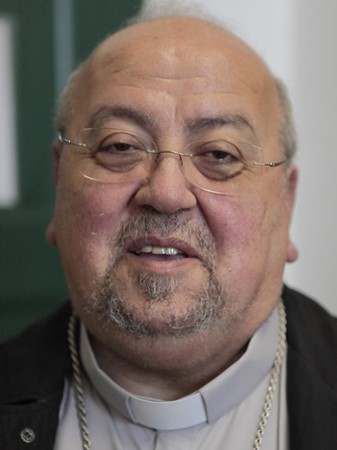|
'You can die any number of ways in Damascus'
Thursday, March 26, 2015
"People are praying a lot more. The churches stay open longer. Many of the faithful go there to pray in silence, often for hours on end. They have nothing left but their faith."
‘You can die any number of ways in Damascus’
With much of the focus on the plight of Chaldean
Christian in Iraq and the fight of the US-led coalition against ISIS, the
ongoing crisis in Syria has to some extent fallen from the headlines. However, life
for Christians—and the majority of Muslims—in the country remains extremely difficult.
Maronite Archbishop Samir Nassar of Damascus spoke with international
Catholic charity Aid to the Church in Need about the situation in the Syrian capital.
The war in Syria has now lasted for more than three
years. How are the people able to cope?
Problems are
increasing. The economy is dead. The people have no work. Inflation is rising.
Our currency is rapidly losing value against the dollar. Gradually everyone is
becoming poor. People have used up their savings. They all need help. We as a
Church are trying to support as many families as possible. At the present time
this involves about 300-400 Christian families. The problem is getting the help
to them.
This isn't
without its dangers. It's possible to get robbed or even abducted. But we have
to take this risk. Otherwise our people will leave. We've already been forced
to close down three parishes because the faithful have left. So if we don't
help the few that remain, there'll no longer be a Church in Damascus. 
Is the Syrian state still able to grant any
assistance?
No. People have
to rely on their own resources. But as I said, even those who are still working
are becoming poor because of the high inflation. And there is hardly any work.
Elderly people are of course particularly badly affected. To date they have
been supported by their families. But these no longer have anything. And so we
are trying to take their place. For example, we are running program to make
sure the elderly have access to the medication they need.
Please describe day-to-day life in a war zone
Well, we are now
in the fourth year of the war. In the beginning everybody was afraid of the
fighting, the bombs and the missiles. Now we've got used to it. Life must go
on. Of course we try to be very careful. It's better to stay at home than to be
on the street. You can die any number of ways in Damascus. For instance, you
can be shot by a sniper or blown up by car bombs. And of course there are the
shells. Then again you can die from lack of medical care if you are injured.
The hospitals no longer have sufficient supplies of medicines.
One shell can
kill three or four people immediately on impact and perhaps injure 30 or 40
others. That means ten more will die because they do not receive adequate
medical attention. You can also die of malnutrition. If you are a diabetic, for
example, and need to stick to a certain diet, but don't get it, you are also at
grave risk. Living conditions are also poor in other ways. We have two million
children who no longer go to school. Many schools have been destroyed—and the
ones that are left are completely overcrowded. Each classroom now has around 60
pupils. Just imagine how that affects the teaching and learning process.
Is it possible to buy food if you have money, or is
there simply nothing available?
You can indeed
buy things, especially canned goods. But what's lacking is fresh foodstuffs,
like vegetables, cheese and meat. The problem is also that you have to keep
fresh food in cold storage because of the heat. But unfortunately we have
problems with the power supply. As a result, we eat mainly canned products and
non-perishables such as rice or lentils.
Have the war and the distress it causes deepened the
faith of your flock?
Yes. There is definite
a return to the faith. People are praying a lot more. The churches stay open
longer. Many of the faithful go there to pray in silence, often for hours on
end. They have nothing left but their faith. They are in a dead-end and are waiting
for death. At the end of Mass they make a point of saying goodbye, because they
don't know whether they will see one another the next day.
The mood is very
resigned. People surrender to their fate. So it's a very difficult situation.
We as a Church are at the moment doing more social work than pastoral work, as
we are trying to alleviate the people's distress. There is no other help
available. The family is basically the only intact institution. It's the family
which helps, shares and supports. People’s identification with their families is
very pronounced. Without the family, the situation would be an utter and
complete disaster.
Are you able to keep track of the number of your
faithful who have left Syria?
No. We don't
have any statistics. But the number of people taking the sacraments is falling
from year to year—very sharply. In 2012 there were more baptisms and weddings
than in 2013. The number of funerals, on the other hand, is rising. There were
previous plans to build a kindergarten or a school, but now we are planning for
the enlargement of the Christian cemetery.
ACN photo: Archbishop Samir Nassar
|